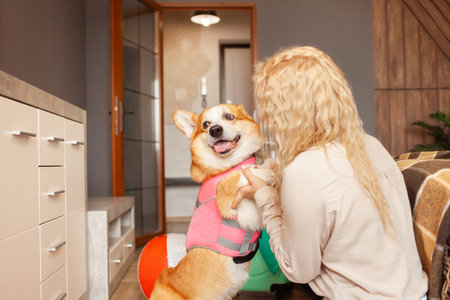1. Understanding the Nutritional Needs of Active and Working Dogs
Active and working dogs, such as herding breeds, hunting dogs, and service animals, require a specialized diet to maintain their energy levels and overall health. These high-energy pets burn more calories than the average household dog, meaning their diet must be rich in essential nutrients that support endurance, muscle recovery, and sustained activity.
Macronutrient Balance
The right balance of macronutrients—proteins, fats, and carbohydrates—is crucial for active dogs. Each macronutrient plays a specific role in maintaining their energy and physical performance:
| Macronutrient | Function | Sources |
|---|---|---|
| Protein | Supports muscle repair and growth | Chicken, beef, fish, eggs |
| Fats | Main source of long-lasting energy | Fish oil, chicken fat, flaxseed |
| Carbohydrates | Provides quick energy for short bursts of activity | Sweet potatoes, brown rice, oats |
Caloric Intake for High-Energy Dogs
The caloric needs of an active or working dog depend on factors such as size, breed, age, and activity level. In general, these dogs require more calories than a sedentary pet. For example:
- A highly active medium-sized dog (e.g., Border Collie) may need 1,200-1,800 calories per day.
- A large working breed (e.g., German Shepherd) may require 2,000+ calories daily.
- Puppies or younger dogs engaged in training may need additional calories to support growth.
If youre unsure how many calories your dog needs, consult your veterinarian to tailor a feeding plan based on their unique energy requirements.
Breed-Specific Considerations
Certain breeds have distinct dietary needs due to their metabolism and work demands. Here are some examples:
| Breed Type | Nutritional Considerations |
|---|---|
| Sled Dogs (e.g., Siberian Huskies) | Require high-fat diets to sustain endurance in cold climates. |
| Herding Breeds (e.g., Australian Shepherds) | Benefit from protein-rich meals to support agility and stamina. |
| Larger Working Breeds (e.g., Rottweilers) | Might need joint-supporting nutrients like glucosamine due to heavier body weight. |
The Importance of Hydration
Adequate hydration is just as important as food intake for active dogs. Always provide fresh water throughout the day, especially after exercise or work sessions. Dehydration can quickly lead to fatigue and decreased performance.
The right diet ensures that your high-energy dog stays strong, healthy, and ready for any task at hand. By balancing macronutrients, adjusting caloric intake, and considering breed-specific needs, you can help fuel your dogs active lifestyle effectively.
2. Essential Nutrients for Performance and Endurance
Active and working dogs need a well-balanced diet to keep up with their demanding physical activities. The right combination of proteins, fats, and carbohydrates plays a crucial role in muscle recovery, stamina, and overall energy levels.
Proteins: Building and Repairing Muscles
Protein is the foundation of any high-energy dogs diet. It helps build strong muscles, repair tissues after strenuous activities, and maintain overall health. Dogs that engage in intense exercise require higher protein intake to support muscle recovery and prevent fatigue.
Best Protein Sources for Active Dogs
| Protein Source | Benefits |
|---|---|
| Chicken | Lean protein that supports muscle growth |
| Beef | Rich in essential amino acids for strength |
| Fish | Packed with omega-3s for joint health |
| Eggs | Easily digestible and full of nutrients |
Fats: A Long-Lasting Energy Source
Fats provide a concentrated source of energy, making them essential for endurance. Unlike carbohydrates, which burn quickly, fats offer sustained energy that helps working dogs stay active for long periods.
The Importance of Healthy Fats
- Omega-3 Fatty Acids: Support brain function, reduce inflammation, and promote healthy skin and coat.
- An Optimal Fat-to-Protein Ratio: Ensures balanced energy without unnecessary weight gain.
Carbohydrates: Quick Energy Boosts
While proteins and fats are vital, carbohydrates play a role in providing quick bursts of energy. They help fuel short, intense activities such as sprinting or agility training.
The Best Carbohydrate Sources for Active Dogs
- Sweet Potatoes: Rich in fiber and slow-releasing energy.
- Brown Rice: Easily digestible and provides lasting stamina.
- Pumpkin: Supports digestion while supplying natural sugars for energy.
A well-balanced diet that includes the right mix of proteins, fats, and carbohydrates ensures that your active or working dog stays strong, energized, and ready for any challenge.

3. Best Food Options for Active and Working Dogs
Choosing the right diet for an active or working dog is essential to keep them performing at their best. Three popular options include high-quality kibble, raw diets, and home-cooked meals. Each has its own benefits and considerations, so let’s break them down.
High-Quality Kibble
Kibble is a convenient and balanced option for many pet owners. However, not all kibble is created equal. Look for brands that use real meat as the first ingredient, avoid artificial additives, and have a high protein content to support muscle maintenance and energy levels.
Benefits of High-Quality Kibble:
- Convenient: Easy to store and serve.
- Nutrient-Dense: Formulated with essential vitamins and minerals.
- Long Shelf Life: Can be stored for extended periods without spoiling.
Raw Diets
A raw diet consists of uncooked meat, bones, organs, and some vegetables. Many owners believe this diet closely mimics what dogs would eat in the wild, providing them with natural nutrition.
Benefits of Raw Diets:
- High Digestibility: Many dogs process raw food more easily than kibble.
- No Fillers or Preservatives: Provides only whole, natural ingredients.
- Improved Coat and Dental Health: Can lead to shinier fur and cleaner teeth.
Considerations:
- Bacterial Risks: Raw meat can carry harmful bacteria if not handled properly.
- Nutritional Balance: Must be carefully planned to meet all nutrient needs.
- Storage Requirements: Requires refrigeration or freezing to keep fresh.
Home-Cooked Meals
If you want full control over your dogs diet, home-cooked meals can be a great choice. This option allows you to select high-quality ingredients while avoiding preservatives and fillers found in commercial foods.
Benefits of Home-Cooked Meals:
- Customizable Nutrition: You can tailor meals to your dog’s specific needs.
- No Artificial Additives: Fresh ingredients provide clean nutrition.
- Easier Digestion: Cooked meals can be gentler on sensitive stomachs.
Considerations:
- Nutritional Balance: Requires careful planning to ensure proper vitamins and minerals.
- Time-Consuming: Cooking fresh meals regularly takes effort.
- Spoilage Risk: Fresh food has a shorter shelf life compared to kibble.
Kibble vs. Raw vs. Home-Cooked: A Quick Comparison
| Kibble | Raw Diet | Home-Cooked | |
|---|---|---|---|
| Nutrient Density | Balanced but varies by brand | Naturally rich but requires careful planning | Fully customizable but must be nutritionally complete |
| Digestibility | Easily digestible for most dogs | Easier digestion for some dogs | Tends to be gentle on digestion |
| Convenience | The easiest option with long shelf life | Takes preparation; requires freezing/refrigeration | Takes time to cook; must be stored properly |
| Shelf Life | The longest-lasting option | Spoils quickly if not stored properly | Spoils quickly; must be used fresh or frozen |
| Main Considerations | Avoid low-quality fillers & artificial additives | Bacterial risks; requires careful meal balancing | Nutritional balance is key; takes time to prepare |
The best diet for your active or working dog depends on their individual needs, your lifestyle, and your ability to provide a balanced meal plan. Whether you choose high-quality kibble, raw food, or home-cooked meals, ensuring they get the right nutrients will keep them healthy and energetic.
4. Hydration and Supplements for Peak Performance
Keeping your active or working dog properly hydrated and providing the right supplements is essential for maintaining their energy levels and joint health. Just like humans, dogs need a balance of water and nutrients to perform at their best.
The Importance of Hydration
Water is the most critical nutrient for an active dog. Dehydration can lead to fatigue, overheating, and decreased performance. Make sure your dog has access to fresh water at all times, especially after exercise or work sessions.
Signs of Dehydration in Dogs
| Sign | Description |
|---|---|
| Loss of Skin Elasticity | Gently pinch your dogs skin; if it doesn’t bounce back quickly, they may be dehydrated. |
| Dry Nose and Gums | A healthy dog should have moist gums and nose. Dryness can indicate dehydration. |
| Lethargy | If your dog seems unusually tired or sluggish, they might need more water. |
| Panting Excessively | Heavy panting beyond normal cooling can be a sign of dehydration. |
| Dark Yellow Urine | Well-hydrated dogs have light yellow urine; dark yellow indicates dehydration. |
Beneficial Supplements for Active Dogs
Certain supplements can support your dogs overall health, particularly for their joints, coat, digestion, and energy levels. Here are some key ones to consider:
Omega-3 Fatty Acids
Omega-3s help reduce inflammation, support heart health, and improve coat quality. They are commonly found in fish oil and flaxseed oil.
Glucosamine and Chondroitin
These supplements support joint health by maintaining cartilage and reducing stiffness—especially important for working dogs that put extra stress on their joints.
Probiotics
A healthy gut is essential for proper nutrient absorption and energy levels. Probiotics help maintain digestive health, reducing issues like bloating or irregular stools.
How to Incorporate These into Your Dog’s Diet
- Hydration: Always provide fresh water and consider adding wet food or broth to meals if additional hydration is needed.
- Supplements: Choose high-quality supplements designed for dogs and follow dosage recommendations based on weight and activity level.
- Monitor Changes: Keep an eye on your dog’s energy levels, coat condition, and mobility to assess if adjustments are needed.
By ensuring proper hydration and adding beneficial supplements to their diet, you can help your active or working dog stay energized, strong, and healthy for years to come.
5. Feeding Schedules and Portion Control
Proper meal timing and portion control are essential for keeping active and working dogs energized throughout the day. Overfeeding can lead to weight gain, while underfeeding may result in low energy levels and poor performance. Finding the right balance ensures your dog stays strong, healthy, and ready for action.
Meal Timing for Active Dogs
High-energy dogs benefit from a consistent feeding schedule that supports their activity levels. Instead of one large meal per day, splitting meals into two or three portions helps maintain steady energy and prevents digestive issues.
Recommended Feeding Schedule
| Meal | Time | Purpose |
|---|---|---|
| Breakfast | Morning (before activity) | Provides initial energy for the day |
| Midday Snack (if needed) | Midday (between activities) | Keeps energy levels stable |
| Dinner | Evening (after activity) | Aids recovery and muscle repair |
Portion Control: How Much Should You Feed?
The right portion size depends on your dogs weight, activity level, and metabolism. Overfeeding can lead to obesity, while underfeeding may cause fatigue. Use the guidelines below as a starting point, adjusting based on your dogs needs.
General Portion Guidelines Based on Activity Level
| Dogs Weight | Moderate Activity (Cups/Day) | High Activity (Cups/Day) |
|---|---|---|
| 10-20 lbs | 1 – 1.5 cups | 1.5 – 2 cups |
| 20-50 lbs | 1.5 – 3 cups | 2 – 4 cups |
| 50-100 lbs | 3 – 5 cups | 4 – 6 cups |
| 100+ lbs | 4 – 6 cups | 5 – 8 cups |
Avoiding Overfeeding and Underfeeding
- Avoid free-feeding: Leaving food out all day can lead to overeating and weight gain.
- Monitor body condition: Check your dogs weight and adjust portions as needed.
- Treats count: Limit treats to no more than 10% of daily caloric intake.
- Select nutrient-dense food: High-quality proteins and fats provide sustained energy without excessive calories.
- Kibble vs. Raw Diet Considerations:If feeding raw or homemade diets, ensure proper portioning with the help of a vet or canine nutritionist.
The Importance of Hydration with Meals
Adequate hydration is just as important as food intake. Ensure fresh water is always available, especially after exercise and meals. Wet food or adding water to dry kibble can also help maintain hydration levels.
A well-planned feeding schedule with appropriate portion sizes ensures that active dogs receive the fuel they need without unnecessary weight gain. By monitoring their body condition and adjusting portions accordingly, you can keep your energetic pup in top shape!
6. Recognizing and Addressing Dietary Issues
Even with the best diet, active and working dogs can sometimes experience nutritional deficiencies or digestive problems. Recognizing these issues early and making the necessary dietary adjustments can help keep your dog healthy and full of energy.
Common Signs of Nutritional Deficiencies
If your dog is not getting the right balance of nutrients, they may show signs that indicate a deficiency. Here are some common symptoms and what they might mean:
| Sign | Possible Cause | Solution |
|---|---|---|
| Dull coat or excessive shedding | Lack of essential fatty acids, protein, or vitamins | Add omega-3 and omega-6 fatty acids (fish oil, flaxseed), ensure high-quality protein sources |
| Low energy or fatigue | Insufficient calories or improper macronutrient balance | Increase calorie intake with nutrient-dense foods, adjust protein and fat levels |
| Poor muscle tone or weakness | Lack of high-quality protein or amino acids | Add lean meats, eggs, or supplements rich in essential amino acids |
| Brittle nails or dry skin | Nutrient deficiencies (biotin, zinc, vitamin E) | Add foods rich in these nutrients such as eggs, fish, and leafy greens |
| Poor appetite or weight loss | Poor diet palatability or underlying health issue | Try different protein sources, ensure food is fresh and high-quality, consult a vet if needed |
Digestive Issues and How to Address Them
A healthy digestive system is crucial for active dogs to absorb nutrients efficiently. Common digestive problems include:
Sensitive Stomach or Frequent Diarrhea
This could be caused by food intolerance, low-quality ingredients, or sudden diet changes. To help:
- Avoid artificial additives and fillers.
- Select highly digestible proteins like chicken, lamb, or fish.
- If switching diets, transition gradually over 7–10 days.
- Add probiotics or plain yogurt to support gut health.
Bloating or Gas Issues
If your dog experiences excessive gas or bloating, it may be due to eating too fast, consuming certain ingredients (e.g., legumes), or poor digestion. To manage this:
- Use a slow-feeder bowl to reduce gulping air while eating.
- Avoid foods that commonly cause gas (beans, dairy products).
- Add digestive enzymes to improve nutrient absorption.
- If bloating becomes severe (e.g., distended abdomen, discomfort), seek veterinary help immediately.
Irritable Bowel Symptoms (Vomiting or Constipation)
If your dog frequently vomits after meals or struggles with constipation, consider these solutions:
- Avoid feeding right before intense activity.
- Add fiber-rich foods like pumpkin or sweet potatoes to regulate digestion.
- Mild vomiting could be from eating too fast—try feeding smaller portions more frequently.
- If vomiting persists beyond occasional occurrences, consult a veterinarian.
Tailoring Your Dog’s Diet for Optimal Health
No single diet works for every dog. Depending on their activity level, breed, and unique needs, adjustments may be required. If you notice ongoing issues despite trying these solutions:
- Consult with a veterinarian to rule out underlying health conditions.
- Consider allergy testing if food sensitivities are suspected.
- Tweak macronutrient ratios based on performance and energy requirements.
- If feeding commercial kibble, opt for high-quality brands free from unnecessary fillers.
- If preparing homemade meals, work with a pet nutritionist to ensure balanced nutrition.
A well-balanced diet tailored to your dogs needs will support their performance and long-term health. By monitoring their condition and making timely dietary adjustments, you can keep them energetic and thriving!


